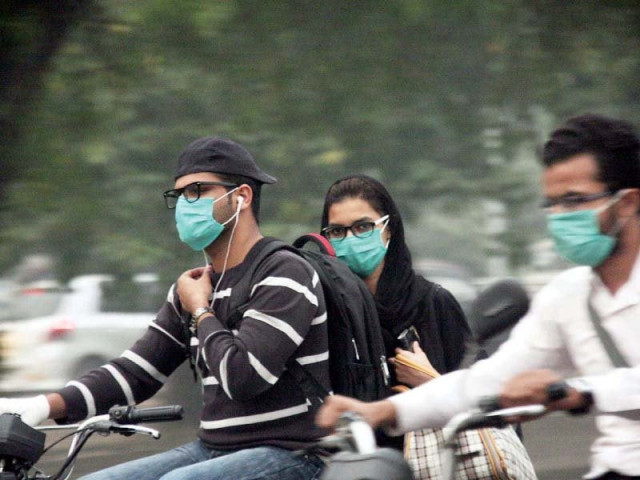Drippy situation: Respiratory infections clogging up Lahore
Medical experts suggest wearing masks during fog

The sale of face masks in Lahore has witnessed a sharp increase owing to smog.
PHOTO: EXPRESS
“The vast majority of upper respiratory infections are caused by viruses and are self-limited,” commented Dr Salman Kazmi from Mayo hospital.
He said symptoms of upper respiratory infection include a cough, sneezing, nasal discharge, nasal congestion, runny nose, fever, scratchy or sore throat and nasal breathing.
“As the symptoms turn viral, people must take care of their children to avoid a visit to doctor,” he said. The doctor further stated that simple techniques, such as proper washing of hands and covering the face while coughing or sneezing, may reduce the spread of such infections.
He added since winter had arrived, people must stay warm to avoid a cold, flu and skin cracks; all of which are symptoms of respiratory ailments.
“A few precautionary measures can be taken, such as staying away from hospitals that already have a large number of patients with respiratory problems,” he commented.
During the winter season, he said viral infections ‘spread like wildfire’ and are capable of being transmitted from person to person within hours.
Dr Salman further said children were the most vulnerable to ailments in winter, adding diarrhoea, skin disorders and dryness were among the most common problems. “They should be given food rich in vitamin A. Eating carrots and drumsticks can be helpful,” he added.
ENT specialist Dr Owais Samee told The Express Tribune that people should avoid drinking cold water and eating spicy food, saying common precautions like wearing warm cloths and footwear can go a long way in staving off diseases during the winter.
Published in The Express Tribune, January 2nd, 2017.



















COMMENTS
Comments are moderated and generally will be posted if they are on-topic and not abusive.
For more information, please see our Comments FAQ